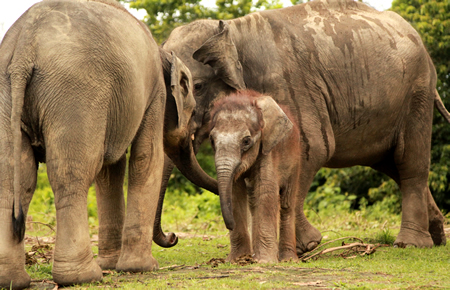Displaced elephant calf joins herd at CWRC
Kaziranga, May 30, 2013: An elephant calf admitted to the Centre for Wildlife Rehabilitation and Conservation (CWRC) three months ago is now stable and has been welcomed by the four others being hand-reared by IFAW-WTI for reintegration in the wild.
Although still very young, the calves are beginning to display signs of attachment to each other, forming a social unit and behaving as a herd.

The calf and herd at CWRC. Photos: Sheren Shrestha/IFAW-WTI
The latest calf was brought to CWRC on February 26 this year. It was found alone stuck on a sand bar in the Brahmaputra River in Dhemaji district, possibly washed away while the herd crossed the river. The calf was rescued by locals from Gerjai village after hearing its screams at night. The Forest Department authorities assisted by the IFAW-WTI Mobile Veterinary Service unit of North Bank transported the calf to CWRC.
“The calf was weak, quite traumatised and suffering from naval and urinary infection too, but is stable now,” said Assistant Veterinary Surgeon Dr Bishwajit Boruah who received the calf in February.
“The only worry was that she was showing signs of fat intolerance, and has not put on much weight despite being fed on the milk formula. We have now reduced the milk and added other sources of carbohydrates in her diet. We are still keeping her indoors at night, and during afternoons when it gets hot to prevent dehydration, but leave her in an outdoor enclosure during mornings and evenings, and also let her interact with the other calves to allow bonding,” added CWRC veterinarian Dr Anjan Talukdar.
As part of the Elephant Reintegration Project, these displaced calves are hand-reared for reintegration with wild herds. Very young calves are stabilised in the quarantine during admission. They are bottle-fed and kept indoors for a few months. Gradually they are introduced to the older calves that go for daily walks in the nearby forests and spend nights in an open-air fenced enclosure. They are then moved to the wild together and allowed time for in situ acclimatisation at the release site, under the care of an animal keeper.
“Elephants are highly social animals. Allowing the calves to mingle will help develop social bonds, which will be crucial when they are moved to the wild. Not only do they hone their social skills together, as they roam about the forests during in situ acclimatisation, it is this social unit that keeps them the much-needed company till they find wild herds that accepts them,” said Dr Rathin Barman, Manager, CWRC.

The eldest, Jakhala, seems to be very protective of the new calf.
Photos: Sheren Shrestha/IFAW-WTI
“The eldest – Jakhala,” he added, “is a mother figure to all of them; she seems to have developed a special affinity to the new calf and is very protective about her. If this was a herd in the wild, she would be the matriarch.”









